
What types of reading skills do students need to be successful? This informative site focuses on students with learning disabilities. Explore!
- Subject:
- Arts
- English Language Arts
- Material Type:
- Student Guide
- Date Added:
- 12/01/2023

What types of reading skills do students need to be successful? This informative site focuses on students with learning disabilities. Explore!

In this lesson, students will be able to gather information from provided resources to answer a question. Using the book "Owls", the teacher will read the book while asking guiding questions. After the book, the students will have to opportunity to examine a real owl pellet and classify items they find inside. A link to a company where owl pellets can be purchased is provided. Pictures and videos of this lesson in action are included.

In this lesson, students will read and discuss story events and then write an informative sentence about one of the events.

In this lesson, students will be able to gather information from provided resources to answer a question. Included is a video of the introduction of this lesson, pictures of students' completed work, and examples of books on the subject of animals in the polar regions.

An online learning game where students read the notes in a detective's notebook and make inferences and predictions to solve the case.
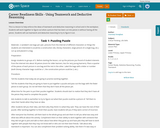
This is a lesson to help enforce the ideas of teamwork and deductive reasoning in school and in the workplace. Students will work together to figure out what a picture that has been cut into peices is without having all the peices. Students will use teamwork and deductive reasoning to try to figure it out.
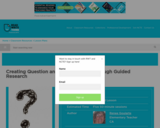
Contains plans for five lessons that develop research skills in primary students by having them create their own question and answer books. In addition to objectives and standards, this instructional plan contains links to sites used in the lessons as well as assessment and reflection activities.

[Free Registration/Login Required] Choose from a variety of worksheets to help students practice writing to compose informative/explanatory texts.
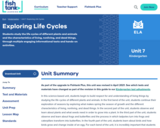
Students study the life cycles of different plants and animals and the characteristics of living, nonliving, and dead things, through multiple engaging informational texts and hands-on activities.
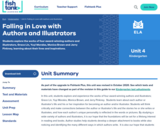
Students explore the works of four award-winning authors and illustrators, Grace Lin, Yuyi Morales, Monica Brown and Jerry Pinkney, learning about their lives and inspirations.

This article surveys three strategies to incorporate into classroom repertoire. They include guided reading, choral reading, and readers' theater.
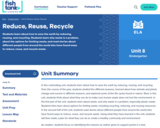
Students learn about how to save the earth by reducing, reusing, and recycling. Students learn why waste is a problem, about the options for limiting waste, and read stories about different people from around the world who have found ways to reduce, reuse, and recycle waste.
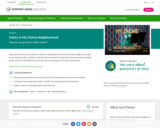
How do you go places safely online? The power of the internet allows students to experience and visit places they might not be able to see in person. But, just like traveling in the real world, it's important to be safe when traveling online. On this virtual field trip, kids can practice staying safe on online adventures. Approximately 30 mins.
LESSON OBJECTIVES: Discover that the internet can be used to visit faraway places and learn new things. Compare how staying safe online is similar to staying safe in the real world. Explain rules for traveling safely on the internet.

In this video from GreatSchools, viewers will observe strategies that first graders use as they research topics and organize new information. Observers will note the conversations about what they learn and examples of note taking. [1:45]
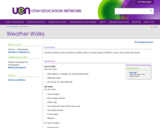
In this lesson students will learn about weather by taking walks in various types conditions: sunny, rainy, windy and snowy.
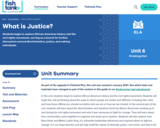
Students begin to explore African American history and the civil rights movement, serving as a launch for further discussions around discrimination, justice, and valuing individuals.
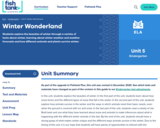
Students explore the beauties of winter through a variety of texts about winter, learning about winter weather and weather forecasts and how different animals and plants survive winter.

This lesson, based on the animated story "The Worm Turns" from the PBS KIDS series MOLLY OF DENALI, helps children use several types of informational texts to gather facts. In the video, Molly and her friends are frightened after hearing tales of gigantic ice worms! They head to the library to read newspapers, websites, and books to discover the truth. Students also use a variety of sources to locate information pertaining to a current unit of study. They use the text's features and a graphic organizer to collect information about their topic. Media and support materials are provided.

In this animated story [25:25] from the PBS KIDS series MOLLY OF DENALI, a power failure and a scary tale leave Molly and her friends terrified of gigantic ice worms. After seeing evidence of ice worms at the lake, Molly decides that they need to learn more. Are ice worms a real threat to Qyah, or has Grandpa Nat made them seem scarier than they really are? Leave it to Molly, Trini, and Tooey to find out the truth! Support materials are provided.

Lesson which provides three types of reports for early elementary students to share. These allow young students to see themselves as writers with something useful to contribute from an early age.